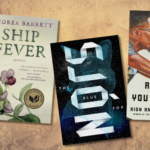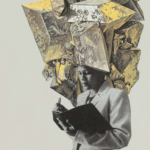
5 of the Best Books That Use Online Communication as a Device
This list of books that use online communication is sponsored by The Hive by Barry Lyga and Morgan Baden from KCP Loft.
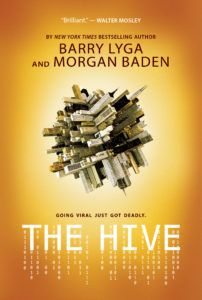 New York Times bestselling authors Barry Lyga and Morgan Baden have teamed up for the first time to create a novel that’s gripping, terrifying and more relevant every day. The Hive follows seventeen-year-old Cassie, who, after being “condemned” on social media, is on the run from a deadly state-sanctioned mob seeking to exact IRL punishment. Aided by a shadowy underground network, Cassie becomes an unlikely heroine, as her search for the truth makes her a threat to the entire unjust system. The Hive is a breathless race through the day after tomorrow, where online and real life are blurred beyond recognition, and social media casts ever-darker shadows.
New York Times bestselling authors Barry Lyga and Morgan Baden have teamed up for the first time to create a novel that’s gripping, terrifying and more relevant every day. The Hive follows seventeen-year-old Cassie, who, after being “condemned” on social media, is on the run from a deadly state-sanctioned mob seeking to exact IRL punishment. Aided by a shadowy underground network, Cassie becomes an unlikely heroine, as her search for the truth makes her a threat to the entire unjust system. The Hive is a breathless race through the day after tomorrow, where online and real life are blurred beyond recognition, and social media casts ever-darker shadows.
Since computers became household staples, authors have been fascinated with using online communication forms to tell stories. And since then we’ve only become more immersed in the world of our phones. Most people in modern societies create complex and rich online personas, which has added an even more interesting dimension to these types of books. In some ways this format, which has had decidedly mixed reviews, is merely a modern form of the epistolary novel which can provide a very interesting way to discover characters. I’ve compiled a list of some books that utilize internet communication platforms to tell a story in a particularly compelling manner. They encompass a range of genres and styles, proving that even within a more limited format, words can do amazing things.
 TTYL by Lauren Myracle
TTYL by Lauren Myracle
This is one of the first books I remember from my childhood that embraced instant message as a storytelling platform. The book is told entirely in the form of IM chats, harkening back to the days of AIM and MSN messenger. Of course, it was written back in 2005, when that stuff was still relatively novel. It follows the trials and tribulations of three teenage girls trying to navigate the ever tumultuous world of high school. It is the first in a series of books titled Internet Girls, and while the books aren’t over the top wonderful, they are very entertaining. This book also has the honor of being a “banned book” because of its “adult content” such as swearing (gasp!) and musings about boy problems (double gasp!). I think most teen girls would find the content refreshing, honest and highly relatable. (Because really what do we use the internet for if not to talk about all the stuff we can’t talk about in person?)
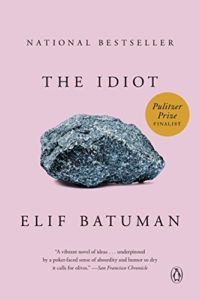 The Idiot by Elif Batuman
The Idiot by Elif Batuman
Despite just being published in 2018, this book takes place in the ’90s when email was still a novelty. It follows a college freshman, Selin, who begins a confusing but intriguing email exchange with a senior, Ivan. While the book doesn’t exist only in the world of the emails, that is where Ivan and Selin’s relationship blooms. They do interact in person, but rarely say much to each other. It is as if their relationship exists only online. Batuman beautifully weaves in the email exchanges to show the burgeoning relationship in the most infuriating, and intoxicating way.
 Tweet Cute by Emma Lord
Tweet Cute by Emma Lord
This new YA romcom, set to come out January 2020, follows the story of two teens, Pepper and Jack, who help out at their families’ businesses by running the Twitter accounts. When business starts to get ugly, their rivalry explodes all over the Twitter-verse. Meanwhile, they are actually falling for each other via an anonymous chat app that Jack built. Think an updated You’ve Got Mail for the Twitter clap-back age. And it incorporates multiples different internet forums, allowing two people to duke it out on one and fall in love on the other, in a way that could only happen thanks to the anonymity of the internet. It’s a cute, engaging novel that is sure to keep you entertained from start to finish.
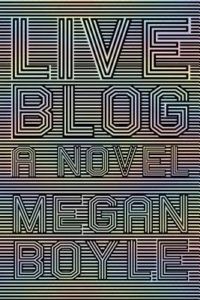 Liveblog by Megan Boyle
Liveblog by Megan Boyle
Liveblog is essentially a memoir written in real-time in the form of continuous life updates on a blog site. It follows the author’s journey of deciding to document every thought and action she has every day for seven months. The idea behind this was that Boyle was unhappy with her life and that by posting everything online, she could be open to judgment and criticism and facilitate some change in her life. It was a way of holding herself accountable. It is almost unbearably honest, and bizarre to read about every thought someone has on a daily basis, but all the more intriguing for its poetic mundanity. Liveblog utilizes a different internet format that we haven’t yet explored in earlier books and is unique in that it is a singular voice. It certainly provides insight into another interesting aspect of the lives we create online and how it affects us IRL.
 No Friend But the Mountains: Writings From Manus Prison by Behrouz Boochani
No Friend But the Mountains: Writings From Manus Prison by Behrouz Boochani
No Friend But the Mountains was written by Kurdish Iranian journalist Behrouz Boochani from his prison cell on a mobile phone and sent in snippets via WhatsApp to the outside world. This book is the collected and translated account of what he went through during his five years of detention. In 2013, he was fleeing his country when he was illegally detained on Manus Island off the coast of Australia. He provides a horrifying firsthand account of the abuses that were occurring on this island prison—which was meant to be a temporary detention center. This book is an amazing testament to Boochani’s will to survive and share his story with the world. The book is completely shaped by the way in which it had to be written and is all the more beautiful because of the unique form it takes.
Also In This Story Stream
- An Ode to the Technology That Enriches My Reading Life
- Big Brother Is Watching You: 5 Books To Read If You Don’t Cover Your Webcam
- On the Lesser Known Sci-Fi Writers Who Predicted Future Technology
- 10 Kids Books about Inventors to Inspire Young Creators
- My Ideal Ereader
- Why Did Interactive Ebooks Never Catch On?
- Electric Dreams: Fiction’s Greatest Technopaths
- Which SF/Dystopian Book Should You Read Next?
- 6 Books Written by Women Working in Tech
- 6 YA Books About Teens Embedded in Technology







